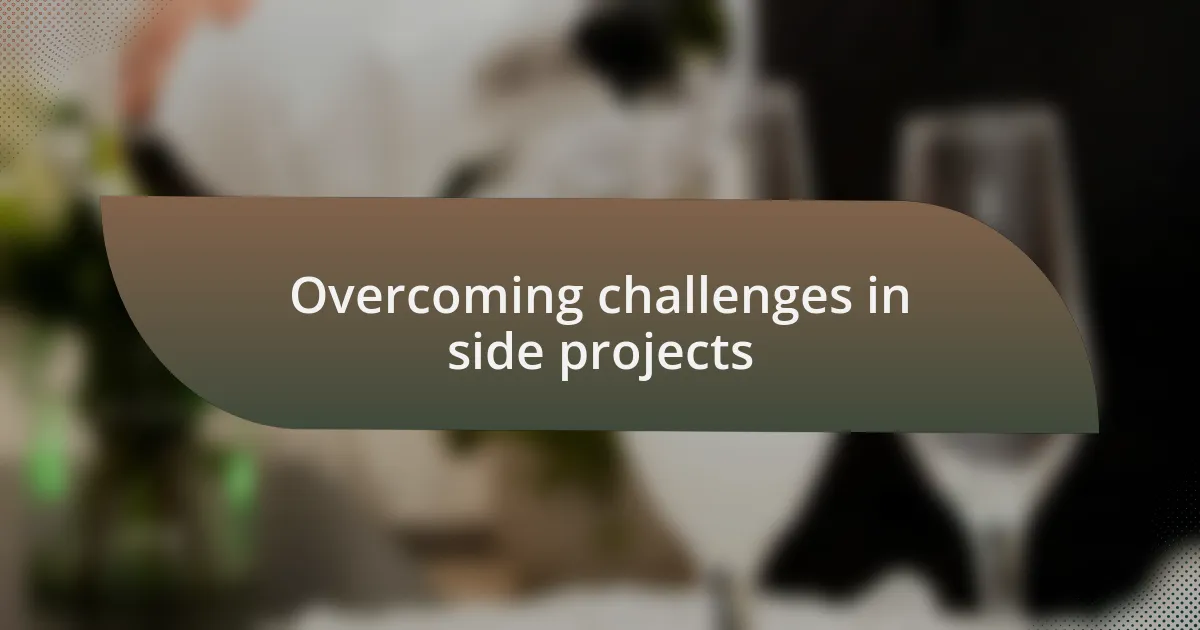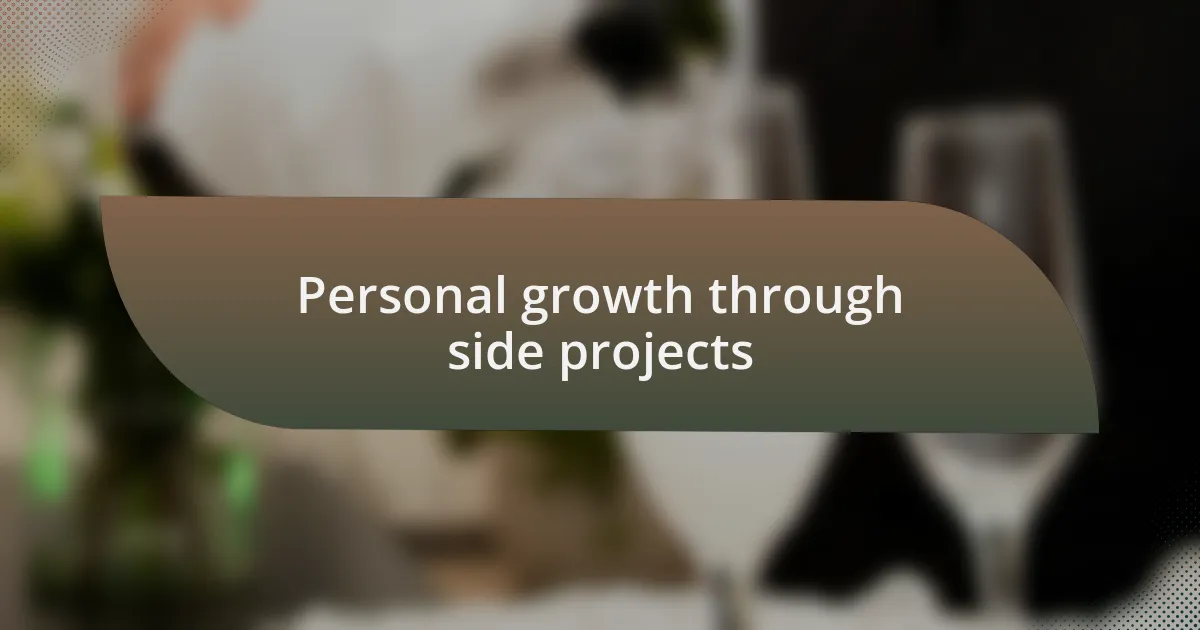Key takeaways:
- Time management and scheduling dedicated work slots significantly improve productivity and make projects less overwhelming.
- Embracing challenges and seeking community support enhances problem-solving skills and fosters resilience.
- Regular reflection on project outcomes helps identify areas for improvement, guiding future project approaches.
- Collaboration with others can provide new insights and strengthen skills, while adapting project management styles can boost productivity.

Skills gained from side projects
One of the first skills I developed from side projects was time management. Balancing multiple responsibilities, like a full-time job and personal commitments, forced me to prioritize tasks efficiently. Have you ever found yourself racing against the clock to meet a deadline? I certainly have, and those experiences taught me to break down larger tasks into smaller, manageable steps, keeping my projects on track.
Another crucial skill I’ve gained is problem-solving. There were countless moments when I hit a wall and felt like giving up, especially when debugging code that seemed impenetrable. I’d often take a step back, look at the problem from different angles, and brainstorm solutions. This iterative process didn’t just improve my code; it helped me become more resilient. Have you faced similar challenges? Each obstacle transformed into a valuable learning experience, making me realize that persistence is key.
Lastly, my technical skills flourished as I dabbled in various programming languages and frameworks. With each side project, I ventured beyond my comfort zone, exploring technologies I had never touched before. I remember the thrill of building my first web app and the subsequent sense of accomplishment when it went live. Has there been a project that made you feel equally proud? The hands-on experience reinforced my knowledge and ignited my passion for continuous learning in a fast-evolving field.

Time management for side projects
Time management for side projects is essential, and I’ve learned that scheduling dedicated slots for work can transform how much I achieve. I remember one summer when I set aside just two evenings a week to focus on coding. That consistency not only led to significant progress on my project but also made it feel less daunting.
One effective strategy I adopted was using simple tools like calendars and task lists. Early on, I found it easy to lose track of time, especially when getting lost in complex code. By breaking my project into smaller tasks and assigning deadlines, I could track my progress. It felt empowering to check things off my list, and suddenly, those overwhelming deadlines seemed less intimidating. Have you ever experienced that rush of accomplishment from crossing items off a to-do list?
Another lesson was the importance of flexibility. Sometimes, life throws unexpected challenges my way, and I’ve had to adapt my schedule. I recall a time when a family commitment clashed with my project timeline. Instead of stressing out, I adjusted my plan, shifted my focus for a few days, and returned to my project re-energized. Flexibility allowed me to maintain my momentum without compromising my personal life. How do you handle unexpected interruptions when working on your side projects?

Overcoming challenges in side projects
Navigating challenges in side projects can often feel like climbing a steep hill, but I’ve learned that persistence is key. There was a time when I faced a particularly tricky bug that took hours to diagnose. It was frustrating; I felt like I was hitting my head against a wall. But instead of giving up, I stepped away for a short walk to clear my mind. That moment of pause allowed me to return with fresh eyes and ultimately find the solution. Have you ever found that stepping back can sometimes lead to the clarity you need?
Technical obstacles can be daunting, but I’ve discovered that a community can be a fantastic resource. I remember reaching out to fellow developers on forums and discovering that many had encountered similar issues. Their insights not only provided solutions but also lifted my spirits. It reminded me that I wasn’t alone in this journey and that collaboration can enhance our skills. Who would have thought a simple question could lead to a robust learning experience?
Time isn’t the only challenge; motivation can wane when progress seems slow. I recall a season where I felt uninspired, questioning whether my project was worth the effort. To combat this, I revisited my original passion for the project, reflecting on what excited me about it in the first place. Reconnecting with that initial spark rejuvenated my drive. Do you ever find yourself needing to rediscover your motivation when tackling a long-term project?

Personal growth through side projects
Embarking on side projects has truly been a catalyst for my personal development. For instance, I took on a project to build a web application from scratch, which pushed me out of my comfort zone. It forced me to learn new frameworks and approaches that I had previously avoided. Have you ever felt that a project could stretch your skills in unexpected ways?
One of the greatest lessons from my side projects is the importance of self-discipline. I vividly recall a time when I committed to coding for just an hour each day, no matter how busy life got. Establishing this routine not only advanced my project but also instilled a sense of consistency in my work habits. Can you relate to the power of carving out that dedicated time amidst a chaotic schedule?
Embracing risks has also been a vital part of my growth. During a coding challenge, I decided to implement an ambitious feature without fully knowing how to execute it. It was exhilarating and terrifying, but the experience taught me to embrace uncertainty and trust my problem-solving skills. What risks have you taken in your projects, and how did they impact your journey?

Applying lessons from side projects
When applying insights gained from side projects, I’ve found that reflection is essential. After completing a project, I take time to analyze what worked well and what didn’t. For example, after finishing a task management app, I realized I had been overly focused on aesthetics rather than functionality. This retrospective approach has fundamentally shaped how I tackle future projects—do you take the time to reflect on your experiences?
Additionally, I’ve learned that collaboration often enhances the application of these lessons. During a recent side project, I collaborated with a fellow developer who had a different skill set. This interaction opened my eyes to alternative solutions and practices that I would not have discovered on my own. Have you ever teamed up with someone and noticed how their insights can amplify your learning?
Finally, adapting my project management style has been crucial. I once struggled with traditional methodologies, but through side projects, I adopted Agile principles that allowed for flexibility and quicker feedback loops. This shift not only improved my productivity but also transformed how I communicate and lead within teams. Have you experimented with different project management styles, and how has it affected your workflow?